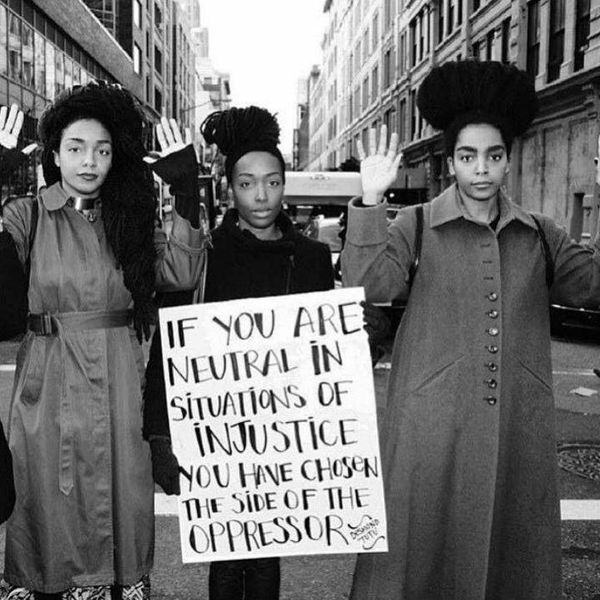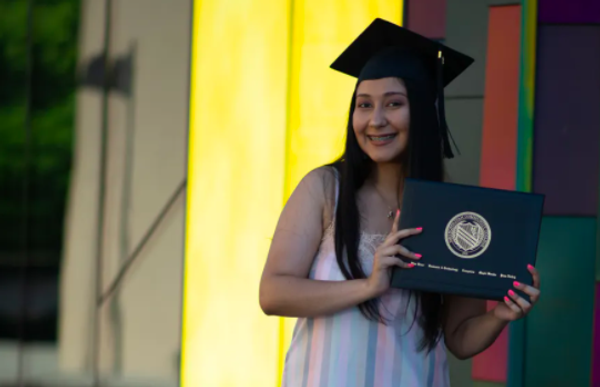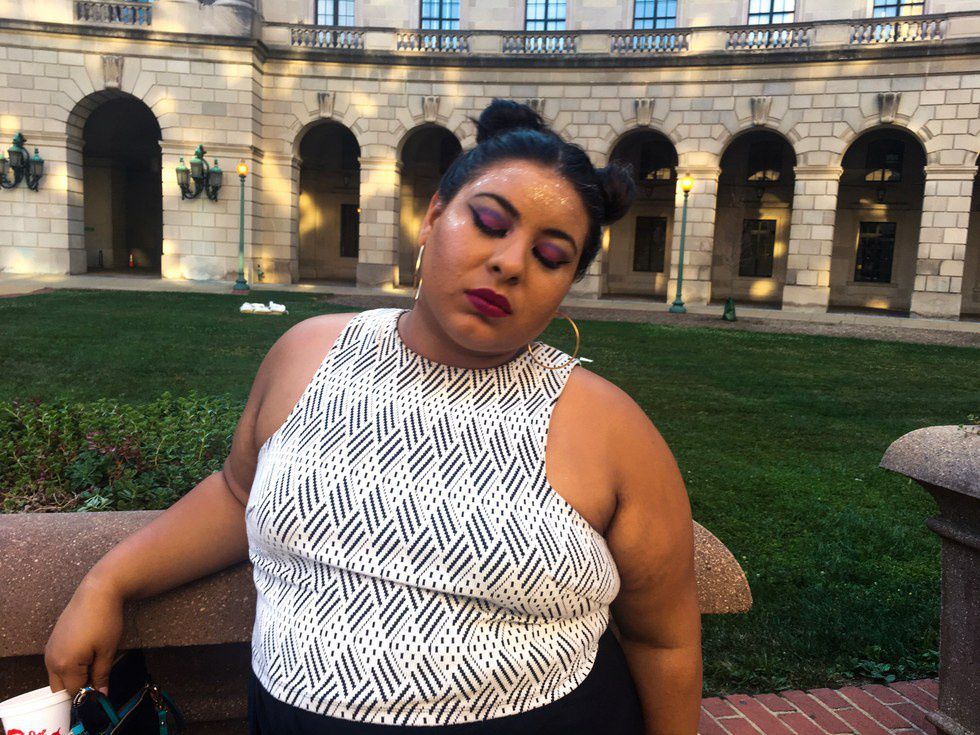Sitting on the floor of the living room in the coziest of apartments in Washington Heights, is my good friend and fellow Mary Washington alumni, Stefany Ruiz, applying makeup before a night out. Our destination? Bembe, an intimate nightclub in Williamsburg, Brooklyn and boy was it fun! But before that, Stefany and I shared some stories about life after college, identity and what should come next.
What type of jobs were you looking to have when you graduated?
'So, what I wanted to do was get an entry-level position at an NGO. I wanted to work in development'
Have you ever felt so overwhelmed about the next step in your career that you wanted to take a nap?
'I feel like that all the time. I always want to take a nap but I am going through that [feeling] more so now because when I graduated I had a plan, so to speak, of what I wanted to do and I am kind of on track with that plan and now, I realize that I don't like it.'
What is it about your current job that you no longer enjoy?
'I just started to feel less enthusiastic about my work and was desiring a change that was more about creativity and having social impact through art and expression. I just felt weird working in development because it's almost like you're confronted with your privilege daily. I get to sit here at this desk in Washington D.C. "help people" supposedly or "save people" supposedly. I just felt like I was a part of this white savior complex and I'm not even ethnically white.'
Did you feel like you were part of the problem in a way?
'A lot of people do this type of work because they want to help people and I do as well, but my personal job does not directly relate to helping people and I thought that maybe in Washington, where I work, I'm not going to feel that but I could try to work in the field and then I'll feel it. But, I don't know that I want to do that anymore.'
You are now looking for a career in the arts. What type of art?
'I write poetry, mostly about my feelings. But I find that when I write about my feelings I can evoke really strong emotions in people and I found that a lot of what I wrote about were things that I had neglected to address in my life. There are things that a lot of people deal with and don't want to talk about because it can be embarrassing or too close to home or maybe you grew up learning from your parents that these are things that aren't talked about and you continuously shut it down. I grew up with certain things happening in my family, that you didn't talk about, that is just home life. And it kind of messes you up because it also pushes you to ignore your feelings and bottle up emotions and stuff. I think that I'm a part of a new unique perspective in this country where I'm a millennial, I'm bicultural, I'm a first-generation American, and there's a lot of us here now that could use those labels to describe themselves, yet our voices are not the mainstream voices. I didn't realize how much that had impacted who I was, that I was growing up in a world where the mainstream voices were not voices that looked or sounded like mine. It made me feel like what I went through was not something that was relatable. It was relatable in the context of my immediate family but not with the greater world.'
What are some of the issues you faced growing up as a first-generation American?
'I think, perhaps, you know, when you're a first-generation American that means that you are growing up essentially in two cultures, right? You're growing up in your parents' home culture, which in many cases can be very different from American culture. For example, my family is from El Salvador and I grew up very Salvadorian. My daily meals were not Kraft Mac 'N' Cheese or spaghetti with meatballs or stuff like that, that's what I saw kids on T.V. eating all the time but I was having arroz con pollo and tortillas and plantains. These things sound exotic here, in the United States but they were part of my daily existence and upbringing in suburban, Washington D.C... and so, as an adult I'm reconciling [with these experiences] a lot.'
Can you give us examples of the major differences between the two cultures?
'I grew up watching telenovelas, and Christianity was a big part of my home. Superstitions are also a big part of how we grew up and those things are not part of American culture. Also, American society is very individualistic. So, when you have a society that is individualistic but you are growing up with a home culture that is about putting the group first, putting the family first that can really fuck you up, to be quite frank. Now, I'm an American girl, I went to college here and I have a job, so I'm going to move out and step out into my own and that's expected for most people here in this country whereas for my family, [They would ask me] "why aren't you contributing to the household?" "How ungrateful and selfish of you, for us to give you everything, and then you take it and you leave." Those are things that we don't talk about in the mainstream media.'
Taking everything that you say into account, how do you see yourself, now as an adult?
'Number one everything that I face from here on out is going to be a first, because my sister and I, we are first-generation Americans. So, whatever social tension that are due to cultural differences there's nothing that I can look for refuge in, especially, in the mainstream media, the way that it is now. I can only look for help and refuge, and understanding in the stories of others and that's why I like sharing, that's why it helps.'
What was one of the realities of being first-generation Americans?
'My parents are American citizens now, but during my childhood, I grew up going to lawyers' offices all the time to renew my parents' green cards and stuff like that. Finding out about, a new immigration policy or issue that came out, was always a big deal in our house. If you're a person that has grown up in this country for generations, that's just so boring, like, "Ugh, policy talk. Why is that important?" Well, it's a reality for a lot of people! And it was a reality of mine for a long time throughout my childhood.'
How do you respond when someone ask you where you are from?
'Oh wow! I go very micro and I always say that I'm from D.C. or if I'm outside of the country, depending on where I am, I might very fully embrace being an American or I might say I'm from El Salvador. For example, I spent time in Czech Republic and I would say that I am from El Salvador a lot just because people would have no idea where that was. Part of the reason why I would say that in a place like Czech is because I wanted to represent that El Salvadorians can go anywhere. So, I wanted somebody in a country as far away and random as Czech Republic to go "Oh wow, I met a Salvadorian" '
When visiting El Salvador, did you ever feel as though you weren't considered a "true" Salvadorian?
'I have definitely heard that narrative. I haven't really experienced that visiting El Salvador because the only people I would engage with were my family members. So, they would never say, "We don't accept you." But El Salvador's biggest export is humans. So, there's a lot of people who go back all of the time.'
In your words what is American culture?
'Well, this election, to be political, highlighted what it is to be American.'
Is American culture renouncing everything that you once were, Salvadorian, German or what have you?
'You could say that but that's just not going to happen, It's just not possible. If I feel like being politically correct, I'll say, I'm American but my family is from El Salvador. So, it's to say, I am from here but I may not act like I am or whatever it means to you when you hear that somebody is from El Salvador. Maybe what it means to you is that my favorite food is a pupusa and not like, steak and potato.'
Any parting words that you would like to share on personal growth or where you see yourself in the future?
'If I could just beat myself on the head right now and make one thing stick, it would be to lose the fear to go for what I want. You know, you go through different failures when you are younger but sometimes I personally feel like I have let past fears hold me back or the fear of not making it. When you want to do something like writing, performing or anything artsy, there's a really low margin of success in that, and the world likes to remind you over and over and over again. But at the end of the day, I hope that I always remember that it's about the mission and the passion for what you're doing and I think that when you are following your heart, things will fall into place.'
I like that we ended this interview on a very inspirational note. That was really good. Thank you Stef, for taking the time.
'You're welcome!'























